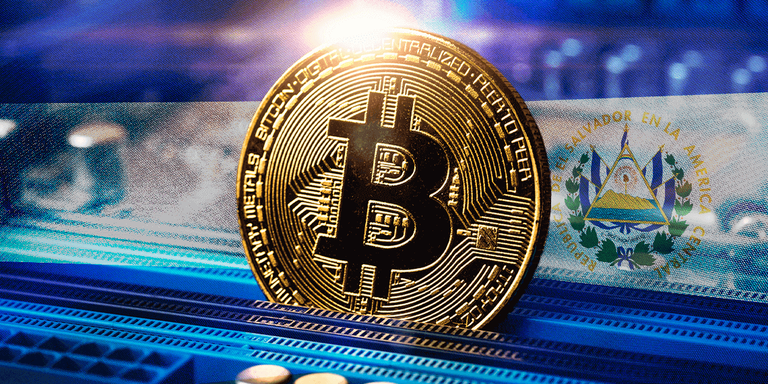
Thanks to an agreement between public and private organizations, children in this country will learn how to use the cryptocurrency.
Since September 7, 2021, bitcoin (BTC) is legal tender in the Republic of El Salvador. The bill to give that status to the cryptocurrency had been sent some months ago to the National Assembly by President Nayib Bukele and received a quick approval by the Legislative Branch, which is mostly pro-government.
The Salvadoran government has made an extensive outreach campaign to expand the use of digital currency among the population. This includes the development of Chivo Wallet, a digital wallet that allows sending and receiving payments in bitcoin and dollars, in addition to being able to easily convert between the two currencies used in the Central American country.
Starting next year, 'America's little thumb' will take a new step that marks a historic milestone worldwide: bitcoin education will officially reach children in all the nation's public schools. This will be possible thanks to an agreement between the Ministry of Education, the National Bitcoin Office and the NGO My First Bitcoin.
Initially, public school teachers will be trained, so that they can then impart the knowledge to their students.
As the first nation to adopt Bitcoin, El Salvador will be an example to the world', said the founder of Mi Primer Bitcoin, John Dennehy. This American who is currently based in the bitcoiner country adds: 'Quality education is our best opportunity to ensure that this example is a positive one'.
Also speaking on the subject was Dalia Platt, the Colombian educator who is co-author of the diploma course offered by Mi Primer Bitcoin. She is ambitious with her expansion plans and says: 'We are focusing on El Salvador to scale to the whole world'.
What will Salvadoran children learn about Bitcoin?
The curriculum will be adapted from the Bitcoin diploma workbook offered by the aforementioned NGO. This content is freely available and can be downloaded from the open source repository, Github, from this link.
There you can see that the course consists of 10 classes in which you learn about the monetary system, the existing types of money, the history of money, inflation, the causes of inflation, why bitcoin was created, what problems this digital currency solves and how to use it.
The Bitcoin diploma workbook includes practical exercises, dynamic activities for educational purposes and the completion of a final paper.
As can be seen in the image below, the My First Bitcoin manual exposes the ideas from an economic perspective close to the Austrian school. This is a very common school of thought among bitcoiners and akin to liberal and anti-statist ideas:
Excerpt from the workbook of the Diploma in Bitcoin offered by the NGO My First Bitcoin. Source: My First Bitcoin
Excerpt from the workbook of the Diploma in Bitcoin offered by the NGO My First Bitcoin. Source: My First Bitcoin
It is worth remembering that the NGO's diploma course is a private initiative and it has not yet been made public what will be, concretely, the curriculum that will reach public schools in El Salvador.
What is being said about this in El Salvador?
Salvadoran public opinion is divided on this issue. President Bukele has a public approval rating of over 90% according to some polls. The president has earned this approval mainly by fighting the gangs with an iron fist.
But, unlike this, he has not been able to spread the enthusiasm for bitcoin to the population on a massive scale. Despite the fact that the law makes it mandatory to accept payments in BTC, few merchants abide by the rule.
Considering bitcoin's cycles, a large price rise should be expected during the 2024-2025 biennium. Perhaps, by then, the valuation that the Salvadoran population, in general, has of President Bukele's bitcoiner measures will change.
Specifically with respect to the introduction of bitcoin content in the curriculum of public schools in El Salvador, the Union of Teachers of Public Education has spoken out critically. This organization regretted that their educational institutions are being used for what they consider 'a failed project such as the introduction of bitcoin in the country'.
Given this situation of deep social 'rift' on the issue, we will have to wait for the coming months to see how the outcome of this story unfolds.


Gracias a un convenio entre organizaciones públicas y privadas, los niños de este país aprenderán cómo utilizar la criptomoneda
Desde el 7 de septiembre de 2021, bitcoin (BTC) es moneda de curso legal en la República de El Salvador. La propuesta de ley para darle ese estatus a la criptomoneda había sido enviada algunos meses atrás a la Asamblea Nacional por el presidente Nayib Bukele y recibió una rápida aprobación por el Poder Legislativo, que es mayormente oficialista.
El Gobierno salvadoreño ha hecho una extensa campaña de difusión para ampliar el uso de la moneda digital entre la población. Esto incluye el desarrollo de Chivo Wallet, una billetera digital que permite enviar y recibir pagos en bitcoin y dólares, además de poder realizar fácilmente la conversión entre las dos monedas que se utilizan en el país centroamericano.
A partir del próximo año, 'el pulgarcito de América' dará un nuevo paso que marca un hito histórico a nivel mundial: la educación sobre bitcoin llegará oficialmente a los niños de todas las escuelas públicas de la nación. Esto será posible gracias a un acuerdo entre el Ministerio de Educación, la Oficina Nacional de Bitcoin y la ONG Mi Primer Bitcoin.
Inicialmente serán capacitados los docentes de las escuelas públicas, para que luego puedan impartir el conocimiento a sus estudiantes.
'Como la primera nación en adoptar Bitcoin, El Salvador será un ejemplo para el mundo', ha dicho el fundador de Mi Primer Bitcoin, John Dennehy. Este estadounidense que está radicado actualmente en el país bitcoiner agrega: 'La educación de calidad es nuestra mejor oportunidad para garantizar que ese ejemplo sea positivo'.
Quien también se expresó sobre el tema fue Dalia Platt, la educadora colombiana que es coautora del diplomado que ofrece Mi Primer Bitcoin. Ella es ambiciosa con sus planes de expansión y dice: 'Estamos centrándonos en El Salvador para escalar a todo el mundo'.
¿Qué aprenderán los niños salvadoreños sobre Bitcoin?
El plan de estudios estará adaptado del libro de trabajo del diplomado en Bitcoin que ofrece la mencionada ONG. Este contenido es de libre acceso y puede descargarse en el repositorio de código abierto, Github, desde este link.
Allí puede verse que el curso consta de 10 clases en las que se aprende sobre el sistema monetario, los tipos de dinero existentes, la historia del dinero, la inflación, las causas de la inflación, por qué se creó bitcoin, qué problemas soluciona esta moneda digital y cómo utilizarla.
En el libro de trabajo del diplomado en Bitcoin se incluyen ejercicios prácticos, actividades dinámicas con fines educativos y la realización de un trabajo final.
Como puede verse en la imagen que se presenta a continuación, el manual de Mi Primer Bitcoin expone las ideas desde una perspectiva económica cercana a la escuela austríaca. Esta es una corriente de pensamiento muy común entre bitcoiners y afín con ideas liberales y anti-estatistas:
Fragmento del libro de trabajo del Diplomado en Bitcoin que ofrece la ONG Mi Primer Bitcoin. Fuente: Mi primer Bitcoin
Fragmento del libro de trabajo del Diplomado en Bitcoin que ofrece la ONG Mi Primer Bitcoin. Fuente: Mi primer Bitcoin
Vale recordar que el diplomado de la ONG es una iniciativa privada y aún no se ha hecho público cuál será, concretamente, el plan de estudios que llegará a las escuelas públicas de El Salvador.
¿Qué se dice sobre esto en El Salvador?
La opinión pública salvadoreña está divida sobre este tema. El presidente Bukele cuenta con una aprobación pública superior al 90% según algunas encuestas. El mandatario se ganó esta aprobación, principalmente, por darle batalla con mano dura a las pandillas.
Pero, a diferencia de esto, no ha logrado contagiar el entusiasmo por bitcoin a la población, de forma masiva. A pesar de que la ley establece la obligatoriedad de aceptar pagos en BTC, son pocos los comerciantes que acatan la norma.
Teniendo en cuenta los ciclos de bitcoin, debería esperarse una gran subida de precios durante el bienio 2024-2025. Quizás, para entonces, cambie la valoración que la población salvadoreña, en general, tiene sobre las medidas bitcoiners del presidente Bukele.
Concretamente con respecto a la introducción de contenido sobre bitcoin en el plan de estudio de las escuelas públicas de El Salvador se ha pronunciado de manera crítica el Sindicato de Maestros y Maestras de la Educación Pública. Esta organización lamentó que se utilice a sus entidades educativas para lo que consideran 'un proyecto fracasado como es la introducción de bitcoin en el país'.
Vista esta situación de profunda 'grieta' social sobre el tema, habrá que esperar a los próximos meses para ver cómo se desarrolla el desenlace de esta historia.
Source / Fuente: Errepar.



Upvoted. Thank You for sending some of your rewards to @null. Read my last posts to make sure that BLURT burning is profitable for you. Before using this bot please make sure your account has at least 100 BP. Get more BLURT:
@ mariuszkarowski/how-to-get-automatic-upvote-from-my-accounts@ blurtbooster/blurt-booster-introduction-rules-and-guidelines-1699999662965@ nalexadre/blurt-nexus-creating-an-affiliate-account-1700008765859@ kryptodenno - win BLURT POWER delegationNote: This bot will not vote on AI-generated content
Thanks for the support!